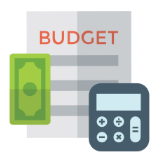Buying your first home is a major milestone – it’s a step towards financial and personal independence. However, we know it can also feel overwhelming, especially when it comes to budgeting in preparation for this life-changing purchase. Many first-time buyers focus on the asking price but overlook the hidden costs that can quickly add up.
So, let’s break down how you can budget for your first home!
What Can You Afford?
Before diving into Rightmove or Zoopla, take a good look at your finances and establish how much realistically you can spend. Have a look at:
- Monthly income – What’s your take-home pay after tax?
- Current expenses – think rent, bills, subscriptions, travel, and any debts or expensive habits you may have.
- Savings – How much have you put aside already?

Set a Realistic Goal
Once you know your property price range, it’s time to plan what you need to save! Your deposit is usually 5% to 20% of the purchase price. For example, if you’re buying a £200,000 property with a 10% deposit, you will need £20,000 upfront.
It is also wise to have a safety net or emergency fund to cover any surprise costs after moving.
Understand the Full Costs (and Include Them in Your Budget)
This is where many first-time buyers get caught out. It’s not just the house price and deposit – here’s what else you’ll need to plan for:
Mortgage fees and arrangement costs are common. Lenders often charge an arrangement fee, typically between £500 and £2,000 depending on the mortgage you choose. You might also need to pay a valuation fee, which covers the lenders assessment of the property’s value – usually between £150 and £1,500. If you use a mortgage broker to help you find the best deal, there may also be a broker fee, either as a flat rate or a percentage of the mortgage amount. Some brokers offer their service for free, so it’s worth shopping around.
Conveyancing and legal fees are another key part of the process. You’ll need a conveyancing solicitor to handle the legal work, including reviewing contracts, completing local authority searches, and managing the transfer of funds. Fees typically range from £800 to £1,500 before VAT and disbursements. Disbursements are third-party costs and may include local searches, Land Registry fees and bank transfer charges.

Simply Move Home can help by connecting you with experienced, trusted conveyancers – making this stage of the process quicker and easier to manage.

Stamp Duty Land Tax (SDLT) is a government tax paid on property purchases above a certain price. But good news – if you’re a first-time buyer, you may not have to pay anything on homes up to £425,000. For homes above that, you’ll pay a percentage based on the value above the threshold. You can use a stamp duty calculator online to check what applies to you.
Build a Monthly Budget Plan
Now that you have the full picture, create a monthly savings plan. Cutting back where you can on things like unused subscriptions and takeaways is a good place to start. You can even consider side income if you’re falling short, such as selling second hand items online to go towards your savings pot. You can track your progress using budgeting appts or a simple spreadsheet to monitor your income, spending and savings each month.

Seeing your savings grow can help keep you motivated and on track toward your homeownership goal!
In Summary
With the right planning and a clear budget, buying your first home is achievable. By taking time now to understand your finances, you’ll set yourself up for a smoother, more confident buying experience. Take it one step at a time, ask for advice when you need it, and celebrate your progress along the way.
If you’re thinking about moving house, get your free conveyancing quotes from us HERE.
